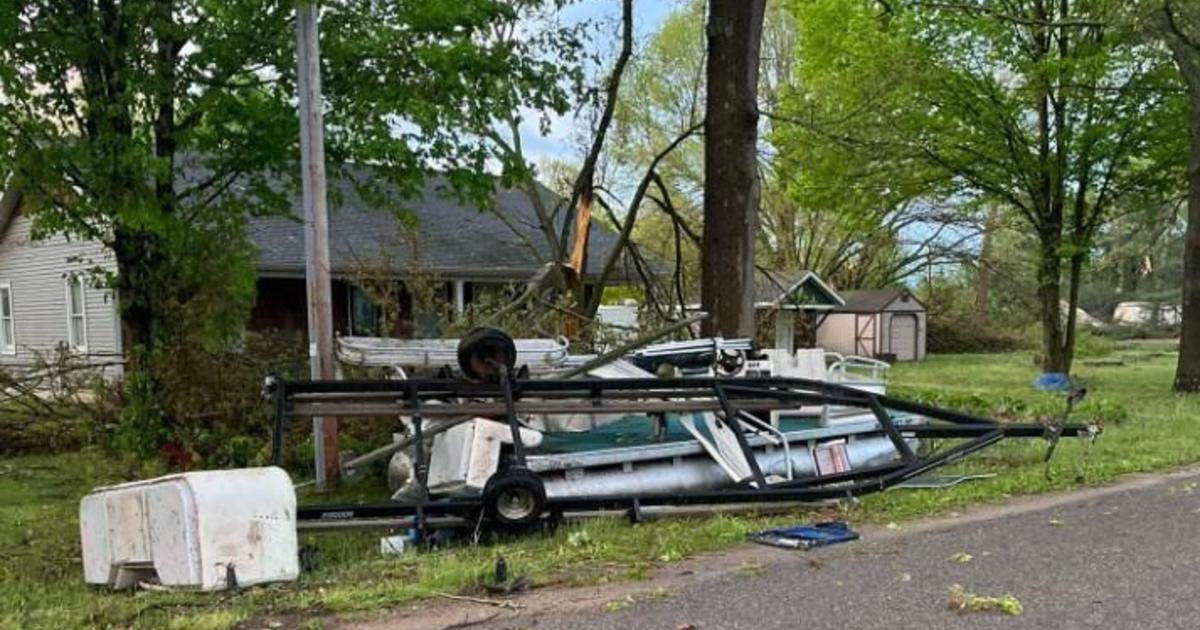MSU, WMU Events Feature Student Engineers' Inventions, Innovations
SOUTHFIELD (WWJ) -- There are days I love my job, and days I really really REALLY love my job.
Friday was one of the latter, as I got to drive around Michigan and meet with tomorrow's engineering leaders at displays of new product inventions at Michigan State University in East Lansing and Western Michigan University in Kalamazoo.
MSU's Fall Design Day took up the seemingly never-ending hallways of the university's mind-bogglingly cavernous College of Engineering building on Shaw Lane, while Western's Innovation Day took up the entry atrium in its gorgeous College of Engineering and Applied Sciences, a 343,000-square-foot tech masterpiece in a research park that was once a cornfield on the western edge of Kalamazoo.
I started my MSU visit with cool augmented reality app intended for automotive use, designed by four computer engineering majors and sponsored by General Motors.
Madalyn Parker of Kalamazoo, David Wigell of Lansing, Matt Wenner of Saline and Jon Bauer of Novi showed off the app by pointing an iPhone at a couple of model cars. The app recognized the designs and displayed the year, make and model. Further taps draw up more information on features and specifications of the vehicle. Obviously, there are potential applications here for marketing purposes or in vehicles.
Next up, a project sponsored by the KitchenAid brand of Benton Harbor's Whirlpool Corp. -- a food processor that not only slices food, but extrudes it. This food processor design featured not just a whirling blade, but also a device that pushes down on pieces of food, forcing them through devices like corers, slicers, molds -- there are a lot of possibilities.
Students John Casuccio of Jackson, Andrew Kaye of West Bloomfield Township, Sarah Kurtz of St. Joseph, Jared Lee of Lake Orion and Mike Marshall of St. Johns said they got their idea started by visiting Whirlpool and spending a day playing with food processors. The idea is to give a small food processor the flexibility of a large, professional one.
And in another example of high school experience being valuable, Kurtz said she got help with programming the processor's microcontroller through her participation in Vex Robotics competitions.
The next project I saw deals with an issue that's been in a lot of health and sports headlines recently -- concussions in football, and how they can lead to permanent disability. Evan Gardetto of Monroe, Brett Johnson of Grosse Pointe Farms, Ron Razalan of Rochester Hills, Thamer Alshuaibi of Saudi Arabia and Yuval Levental of Israel have designed a sensor for a football helmet that measures the force of impact.
Importantly, the sensor powers itself through the motion of the wearer. Eventually, they say, sensors could be linked wirelessly to monitor the cumulative impacts that a player suffers, so that player could be removed from the game before concussion injuries occur.
Finally, I visited a team that worked with MSU Federal Credit Union to develop "Smart Start Savers," an app that manages student savings accounts at elementary schools. The app tracks each student's deposits and interest earned, and offers dashboard analysis of savings trends. The app sends receipts to each student's parent or guardian.
When it comes to the presentations, "the bar goes up every year," said Tom Wolff, associate dean for undergraduate studies. "We used to get posters done in pen. Now the posters have become professional, and 3D printers have come in the last few years, so we have very professional prototype products as well."
Of the 30 companies sponsoring capstone MSU projects, 21 were Michigan-based. In all, 38 teams involving 171 students were involved in the capstone projects. In the event in total were 105 teams involving 404 students.
And it's understandable if you hear these students humming Timbuk3's 1986 hit, "The Future's So Bright, I Gotta Wear Shades." Just about every future engineer I talked to had multiple job offers, and virtually all of them already have jobs lined up after their graduation. Most of them, thankfully, are staying in Michigan, and most of the rest are at least staying in the Great Lakes area, in a swath extending roughly from Minneapolis on the west to Louisville, Ky. on the south to Pittsburgh on the east.
A full list of prizewinners in the competitive part of Design Day wasn't yet available as of Sunday night. All I heard from Spartan Engineering was that the Whirlpool food extruder team took a top prize, the Edison Medal from Mechanical Engineering. The rest of the winners should be available today.
Besides projects from MSU students ranging from freshman to seniors, Design Day also featured visits from 150 students in grades 7-12 from six area schools.
Many thanks to Pat Mroczek, the genial PR source at MSU Engineering, and Leo Kempel, acting dean of the College of Engineering, for showing me around.
Kempel said MSU's engineering college now enrolls 5,400, and he expects that to rise to 6,000 within a couple of years -- double where it was a decade ago. (Click below to hear an audio interview with Kempel.)
Then it was into my car and off to Kalamazoo and Innovation Day.
Favorite projects there included Reliattach, a system for keeping the traveling parts of hydraulic cylinders clean and free of contaminants that reduce the life of seals and cylinders. Designers Robert Schubert of Lake Orion, Matt Garvin of Traverse City and Ryan Harper of Cedar Springs, all industrial and entrepreneurial engineering majors, say they can produce the device for $30 and sell it for $40.
Also interesting: a portable roadside assistant system for changing tires that includes a small padded knee rest and a specialized tool for holding a spare tire in place. This device, designed by Wren Jacob of India, Roberto De La Paz of the Dominican Republic and Luke Bednarczyk of Berkley, would sell for about $15 and cost about $10 to produce.
Ben Page of Kalamazoo and Madeline Welland of Pittsburgh, Pa. showed off an adjustable-length ski that can be made longer or shorter by inserting or removing leaves -- like those on a dining room table.
I also liked The Powerhouse, a plastic box that will be a combination power strip, surge protector and cord storage center, making that spaghetti behind your home entertainment center or computer desk a lot neater and more organized. Creators Jack Nowa of Livonia, Bryan Dillon of Chicago, Nick Vocke of Battle Creek and Laura Karlen of Mason say it'll sell for about
$30.
A really cool burn protector to use when making fried foods was the brain child of Dug Anh Duong-Tran of Grand Rapids, Sujeet Shrestha of Nepal and Arafat bin Mahabib of Brunei. It's made of silicone that will stand up to heat of up to 700 degrees (and most oil used to fry food gets no hotter than 350 degrees). It has small tabs that make it fit along the edge of a frying pan, so that when the oil pops, it won't burn you -- it'll just bounce off the silicone and back into the pan.
Finally, I checked out the Luggage Sock, a product born of the real-world frustrations of WMU exchange students whose suitcase wheels broke at the airport, meaning they had to drag their bags around. The device costs about $1 to make and they plan to sell it for $5 in an airport vending machine. It's a small "sock" of elastic material with polypropylene on the bottom that will glide along the floor. You just pop the elastic "sock" over the broken wheel, and your baggage is mobile again. Roger Stempky of Kalamazoo, Veronica Oldoni of Brazil and Johan Mejia of the Dominican Republic came up with it.
Innovation Day featured projects from WMU industrial and entrepreneurial engineering juniors and freshmen -- as well as a group of middle school product designers who had a ton of interesting ideas too.
Winners in the competitive portion of Innovation Day were:
* Technical Merit Winner: Reliattach
* Popular Vote Winner: 'Dual Leash' by Ramsey Elsfahei, Erik Humes and Wesley Wandel. This device integrated a pet leash in a collar and created an innovative mechanism to reduce the effect of a dog's pull on a leash.
* Middle School Winner - 'Squeaker Kicker' by Jack Fredericks, The Gagie School, Kalamazoo. This device helps soccer players strike a ball correctly.
Thanks to Tycho K. Fredericks, professor of Industrial and Manufacturing Engineering at WMU, and Stephen Butt, professor and interim chairman of the department, for inviting me back again this year for this terrific event. (Click below to hear audio interviews with Fredericks and Butt.)



